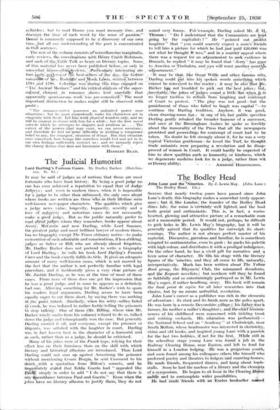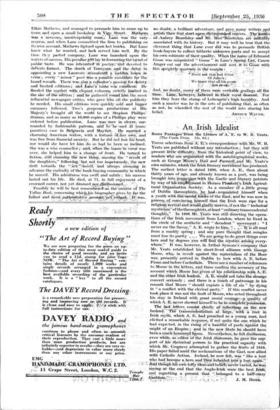The Bodley Head
Alin- Lane and the Nineties. By J. Lewis May.. (John Lane.: The Bodley Head. 15s.) SEEING that nearly twelve,. :years have passed since John Lane's death, this biography makes a somewhat tardy appear- ance ; but if, like -Landor,-.-- the founder of the Bodley Head dines elate, the is'certnitfly; well lighted, 'and the host both genial and enthusiastic. This is, in fact, a warm- - hearted, glowing and attractive picture of a remarkable man and a memorable peried. It would not, perhaps, be difficult to pick holes in Mr.. Lewis May's biography„ but it will be generally agreed that its qualities far outweigh its short- comings. The author is not always perfect master of his material. DiscursiVe, garrulous and familiar, he is sometimeh tempted to sentimentalise, even to gush : he packs-his palette with high colour, and distributes it with a prodigal indulgence. On the other hand, he has .a vivid gift for narrative and_ a keen sense of character. . He fills his stage with the literary figures of the 'nineties, and they all come to life, naturally, interpretatively. Much has been written about The Yellow Book group, the Rhymers! Club, the misnamed decedents, wind the )eynote novelists"; but ,nowhere will they be 'found so faithfully and so entertainingly portrayed as th. Mir. Lewis May's eager, if rather headlong, story. His book will remain the final point de repere for all later researches into that elusive, but by no means unfruitful, revolution.
John Lane's career as a publisher was rich in the elements of adVenture ; its start and its finish,s'cere as the poles apart. He was born in a remoteDeyonshirc,yillages;'., his fathevryaSit farmer, his mother a miller'slclaughter.;, and the.ehief reminis- cences of his. childhood were concerned with tickling trout and robbing orchards. -His eiltichtion was -Perfunctory— the National School and an " Academy " at Chulmleigh, near . South Molten, whose headmaster was interested in electricity, ;China and old books; and inspired young Lane' with a passion for the last two hobbies, if not for the first..,Arbile the schoolboy stage young Lane was found a job in the Railway Clearing House, near Etiston, and left to fend for himself in a London 'lodging. 'I-Te -was h gregarious youth, and soon found among his colleagues others, like himself who preferred poetry and theatres. tnledgers 'and Onnting-houses. - He made friends, frequented dances, and hung about Week- stalls. Soon he had the nucleus of a library and the elemrz of a symposium. He began to sit loose in the Clearing :Wage saddle and to contemplate wider possibilities. He had -mails-friends wittran'EXeter bookseller mined reverse, and when Lane committed the firm to publishing on its own account, Mathews tiptoed upon hot bricks. But Lane knew what he wanted, and luck served him well. By the time thcy parted company, Lane was launched upon the waters of success. His peculiar gift lay i' foreseeing thelOnd of public 'taste. He was interes-terFilf -poetry;--'n'tid -devoted to delcate format.' The death of Tennyson, ad the delay in appointing a new Laureate stimulated a; tliten, bOlitm in verse ; every " minor " poet was a possible li e candidate for the laurel wreath. There was also a collector's passion for ciainty. and limited; editions ; and ItAint e4it Usta w As exlellenti He flooded the market with elegant volumes, strictly limited in the size of tliggdition and .he gathered ,iormdlihn the .most influential newspaper critics, who gave firm. all the publicity he needed. His small editions were-quickly-sold. and bigger successes followed. Tree's gorgeous productions at His Majesty's brought all the world to see Stephen Phillips' dramas, and as many as 10,000 copies of a Phillips play were- ordered before publication. Lane s-,:now in clover, sur-. rounded by fashionable patrons, and-A-6-%e"-niet- it "(coin-. Parative) ease' in Belgravia and Mayfair. He married a
nor would she have let him da so had he been so inclined.
She was a wise counsellor ;--.'arids :the boonAri Verse was Yeats are published without any introduction ; but they will
over, she helped him to a change of front. He turned to
fiction, still chOesing thing, niusing.,the "revolt of readers-Who are airiniiiitid with the autobiographical works,
the daughters," following,' but not too impetuonsly, the new drift toviaids the "lex','itolif,' Stairsing': in advance the curiosity of the book-buying community in which
he moved." His adradroitness-was swift and subtle ; his success t be
lasted out his life. He died, at 71, in full enjoyment of a
crowned career, not yet dimmedA2rAisillusionedtz, !`%;; Possibly he will be best remerAeied-, thecteithr Of The
Yellow Book, concerning Whicik,his biographer gives by ,,far the
fullest and ri7Ostliaritttaritative:800(4K-IW(Wftont.J.-_-le-was charming American widow, with a fortune ad ler own, and Some Pasgage.s`Troni the Litters of A. to W. B. Yeats. was free from financial anxiety. But he did not -14e fig- head, associated with its history. But it may well be true that the cleverest thing that Lane ever did was to persuade British book-buyers to collect hitherto-Unknown poets and to accept his own estimate of their quality. When the naive nfEdmund Gosse was misprinted "Goose " in Lane's *ring List; Canon Ainger cut out the advertisement and sent it to Gosse with this sprightly quatrain in the margin : "f Heed not this lent b'etise _ Of John's ;
We know that all his geese• / Are itfrialle1,
And, no doubt, many ;of them were veritable goslings all the time. borie;_hOiveyer,_helieved in_their royal descent. For him they bore the stamp of .Lohengrin's high-heraldry. And such-a roaster was he -in the Carts of publishing that, as often as not, he- wheedled .the rest of the world into sharing his



















































 Previous page
Previous page